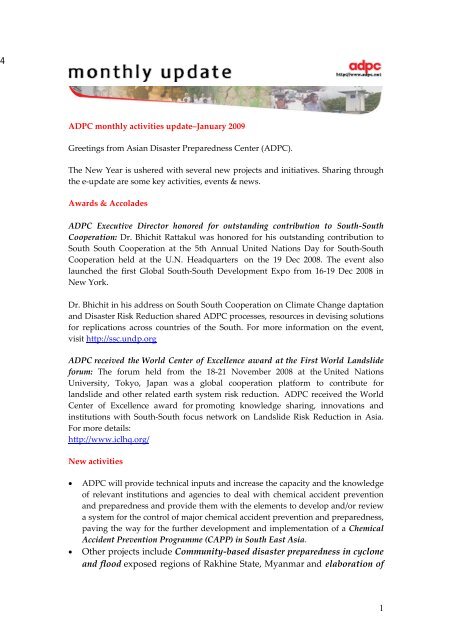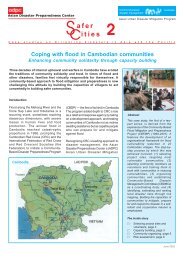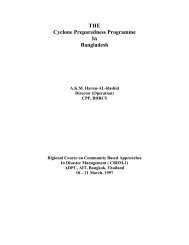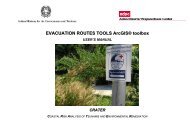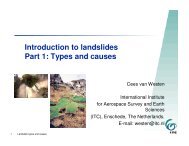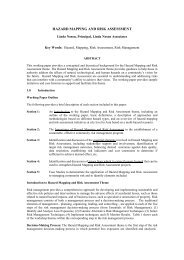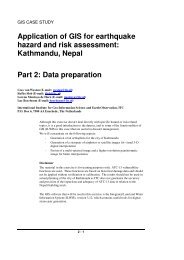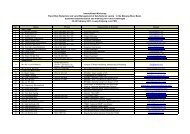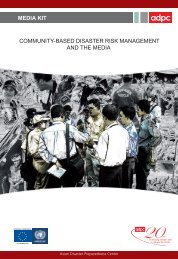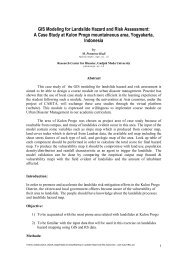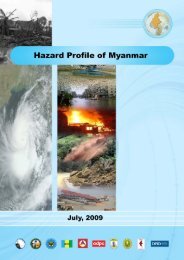J - Asian Disaster Preparedness Center
J - Asian Disaster Preparedness Center
J - Asian Disaster Preparedness Center
Create successful ePaper yourself
Turn your PDF publications into a flip-book with our unique Google optimized e-Paper software.
4ADPC monthly activities update–January 2009Greetings from <strong>Asian</strong> <strong>Disaster</strong> <strong>Preparedness</strong> <strong>Center</strong> (ADPC).The New Year is ushered with several new projects and initiatives. Sharing throughthe e‐update are some key activities, events & news.Awards & AccoladesADPC Executive Director honored for outstanding contribution to South‐SouthCooperation: Dr. Bhichit Rattakul was honored for his outstanding contribution toSouth South Cooperation at the 5th Annual United Nations Day for South‐SouthCooperation held at the U.N. Headquarters on the 19 Dec 2008. The event alsolaunched the first Global South‐South Development Expo from 16‐19 Dec 2008 inNew York.Dr. Bhichit in his address on South South Cooperation on Climate Change daptationand <strong>Disaster</strong> Risk Reduction shared ADPC processes, resources in devising solutionsfor replications across countries of the South. For more information on the event,visit http://ssc.undp.orgADPC received the World <strong>Center</strong> of Excellence award at the First World Landslideforum: The forum held from the 18‐21 November 2008 at the United NationsUniversity, Tokyo, Japan was a global cooperation platform to contribute forlandslide and other related earth system risk reduction. ADPC received the World<strong>Center</strong> of Excellence award for promoting knowledge sharing, innovations andinstitutions with South‐South focus network on Landslide Risk Reduction in Asia.For more details:http://www.iclhq.org/New activities• ADPC will provide technical inputs and increase the capacity and the knowledgeof relevant institutions and agencies to deal with chemical accident preventionand preparedness and provide them with the elements to develop and/or reviewa system for the control of major chemical accident prevention and preparedness,paving the way for the further development and implementation of a ChemicalAccident Prevention Programme (CAPP) in South East Asia.• Other projects include Community‐based disaster preparedness in cycloneand flood exposed regions of Rakhine State, Myanmar and elaboration of1
the Vulneability & Capacity Assessment (VCA) practitionerʹs manualand training of VCA facilitators in Vietnam.Building partnerships• Memorandum of Understanding was signed on 22 Dec 2008 with MyanmarEngineering Society (MES), Yangon, Myanmar to jointly develop the overviewand profile of the hazards of the Union of Myanmar, to create increasedawareness on earthquake risk and promote culture of seismic vulnerabilityreduction. Additionally, ADPC will assist in strengthening MES to build itscapacity.• Early in February, Minister of <strong>Disaster</strong> Management and Human Rights, SriLanka signed a Memorandum of Understanding on roadmap for future DRRcollaborations. The MoU was signed by Hon. Mahinda Samarasinghe, Minister of<strong>Disaster</strong> Management and Human Rights, Sri Lanka and Dr. Bhichit. U.W.L.Chandradasa, Director Technology & Mitigation, <strong>Disaster</strong> Management Centre,Ministry of <strong>Disaster</strong> Management and Human Rights, Sri Lanka and Ambassadorof Sri Lanka, H.E. Mr. Jayaratna Banda Disanayaka witnesses to this MoUsigning.Training & Learning• Strengthening Community‐Based Approaches to Management of AHI in Asia,26‐31 January 2009, BangkokThe second training workshop for Community‐Based AHI ManagementPractitioners is part of the project on ‘Strengthening Community‐Based Approachesto Management of AHI in Asia’, initiated by the AHI‐NGO‐RC/RC‐Asia Partnership– comprised of the <strong>Asian</strong> <strong>Disaster</strong> <strong>Preparedness</strong> Centre (ADPC), CARE, theInternational Federation of Red Cross and Red Crescent Societies (IFRC) and theInternational Rescue Committee (IRC) and funded by the Canadian government viathe <strong>Asian</strong> Development Bank (ADB). The workshop’s overall objective was tosensitize community‐level practitioners to tools and processes that are currentlyavailable to strengthen their work at the community level in managing differentaspects of AHI. Practitioners were given overview of ʹgood practicesʹ and useful tools– based on past experience of community‐based management of AHI in Asia – andtaught to think critically about these and how they can be applied in their owncontextPractitioners contributed to the evaluation of the training materials and, through thisevaluation, to the finalisation of a training package for community‐basedmanagement of AHIParticipants at the workshop were community-level practitioners, i.e. representativesof NGOs, CBOs, national Red Cross societies and other organisations working withcommunities to manage the risks of AHI, from the seven target countries of the2
project, Cambodia, Lao PDR, Thailand, Vietnam, Philippines, Indonesia andMyanmar.• 8th Earthquake Vulnerability Reduction Course (EVRC‐8), 26 Jan‐6 Feb,BangkokThe regional course on Earthquake Vulnerability Reduction for 32 seniorofficials, professionals, practitioners from 11 countries including Thailand,Hong Kong, Afghanistan, Pakistan, Nepal, Bangladesh, Indonesia, Malaysia,Fiji, Papua Guinea and Myanmar included all learning components ofearthquake risk reduction with a perfect blend and balance of lectures,experience sharing, case studies, panel discussion, field visit and hand onexercise. The course trained participants on earthquake vulnerabilityreduction strategies, know‐how for the development of organized approachesfor earthquake vulnerability reduction, knowledge and skills forimplementation of mitigation initiatives, appreciation of risk communication,and analysis of the need to develop multi‐sectoral partnerships for successfulimplementation of mitigation measures.• Second National Public Health and Emergency Management in Asia and thePacific (PHEMAP) Course Coordinators Workshop, 2‐6 Feb, Bangkok,ThailandThe PHEMAP programme is designed to strengthen the national capacities formanaging health risk of emergencies in Asia and the Pacific regions.Under the PHEMAP programme, the second National PHEMAP CourseCoordinators Workshop was organized to familiarize PHEMAP CourseCoordinators with the concept of the PHEMAP course curriculum and to provideguidance on conducting National PHEMAP Courses including administrativeprocedures and teaching methodologies. Representatives of Five (5) member states ofWHO‐SEARO and three (3) member states of WHO‐WPRO will participate in thePHEMAP Course Coordinators Workshop.The workshop will enable participants to conduct a national PHEMAP course basedon the framework provided by the Inter‐regional PHEMAP curriculum, on theprinciples of adult learning and adapted to their national context. The collaboratingpartners were WHO‐WPRO, WHO‐SEARO and the Royal Government of Norwayand ADPC.• Activities undertaken under the Program for Hydro‐Meteorological <strong>Disaster</strong>Mitigation in Secondary Cities in Asia (PROMISE), funded by the U.S. Office ofForeign <strong>Disaster</strong> Assistance (OFDA‐USAID) are as follows,Country project events:3
Indonesia: PROMISE‐Indonesia conducted training for first responders on 10 Jan forthe community at Rukun Warga 1 of Kelurahan Kebon Baru. The course costs camefrom the community’s own resources.Philippines: The Technical Working Group (TWG) held a Reflection Workshop on 13Jan to get the lessons learned, suggestions, and reflections of the TWG about theirworking experience in the PROMISE project.New PublicationsMainstreaming <strong>Disaster</strong> Risk Reduction in the Education Sector‐ Lao PDR‐ Philippines‐ CambodiaThese studies on impacts of disasters on the education sector in Lao PDR, Philippines& Cambodia builds an evidence‐based rationale to raise awareness on integratingDRR concerns into education policies, programs and plans and to advocate forchanging practices in school construction especially in incorporating disaster riskresilient features in new school construction.The publications under the project, MDRD‐Education has been implemented by theUNDP and ADPC, with support from ECHO. Under the ADPC facilitated RegionalConsultative Committee (RCC) on <strong>Disaster</strong> Management umbrella, this collaborative(ECHO‐UNDP‐ADPC) project was implemented as a major contribution to theimplementation of the Hyogo Framework for Action. The project was designed withthe primary focus to assist the Ministry of Education in three RCC countries toimplement a Priority Implementation Partnership (PIP), working with the National<strong>Disaster</strong> Management Organizations, to undertake integration of DRR into thesecondary school curriculum and promoting resilient construction of new schoolsusing research on the past impact of disasters on the education sector.ADPC Website ResourcesProgram for Hydro‐Meteorological <strong>Disaster</strong> Mitigation in Secondary Cities in Asia(PROMISE) resources on the website:‐ <strong>Disaster</strong> Mitigation in Asia, Issue No. 64‐ PROMISE’s quarter report.‐ New PROMISE webpage and online documents for the final reports oncompleted country projects, Bangladesh, Pakistan, Sri Lanka and Viet Nam.http://www.adpc.net/v2007/Programs/UDRM/PROMISE/Default.aspForthcoming Activities• Regional Integrated Multi‐Hazard Early Warning System (RIMES), a 17‐countryregional cooperation on the early warning of tsunami and hydro‐meteorologicalhazards facilitated by the ADPC, is organizing a regional training course ontsunami modeling, as part of its program to build capacities of national warning4
centers of member countries. The course is scheduled from 9‐20 March 2009 inBangkok, Thailand.ADPC Training Schedule for 2009• 6th Hospital Emergency <strong>Preparedness</strong> and Response (HEPR‐6), 16‐20Feb, Bangkok, Fee: 1500 US$• <strong>Disaster</strong> Risk Management, 9‐20 Mar, Gilgit, Pakistan, Fee: 2000 US$• GIS for <strong>Disaster</strong> Risk Management (an introductory course) (GDRM‐3),11‐22 May, Bangkok , Fee: 2000 US$• Mainstreaming <strong>Disaster</strong> Risk Reduction in local Governance (MDRRG‐4), 18‐22 May, Jakarta/ Bandung, Indonesia, Fee: 1500 US$• 9th Inter‐regional Course on Public Health in Emergency Managementin Asia and the Pacific (PHEMAP‐9), 1‐12 Jun, Bangkok , Fee: 2500 US$• Public Health in Complex Emergencies (PHCE‐8), 6‐18 Jul, Bangkok , Fee:2400 US$• Regional Training Course on Community Based <strong>Disaster</strong> RiskReduction (CBDRR‐18), 20‐31 Jul, Bangkok , Fee: 2000 US$• End‐to‐End Multi‐Hazard Early Warning Systems (EWS‐2), 14‐25 Sep,Bangkok , Fee: 2500 US$• Flood <strong>Disaster</strong> Risk Management (FDRM‐10), 12‐23 Oct, Bangkok, Fee:2000 US$• <strong>Disaster</strong> Management Course (DMC‐39), 2‐20 Nov, Bangkok, Fee: 2500US$• Climate Risk Management: Science, Institutions, and Society (CRM‐3),16‐27 Nov, Bangkok , Fee: 2500 US$• GIS for <strong>Disaster</strong> Risk Management(Advance level) (GDRM‐4), 7‐18 Dec,Bangkok, Fee: 2000 US$Please browse through our website www.adpc.net for more ADPC news updates,publications, events and training details for 2009.5


